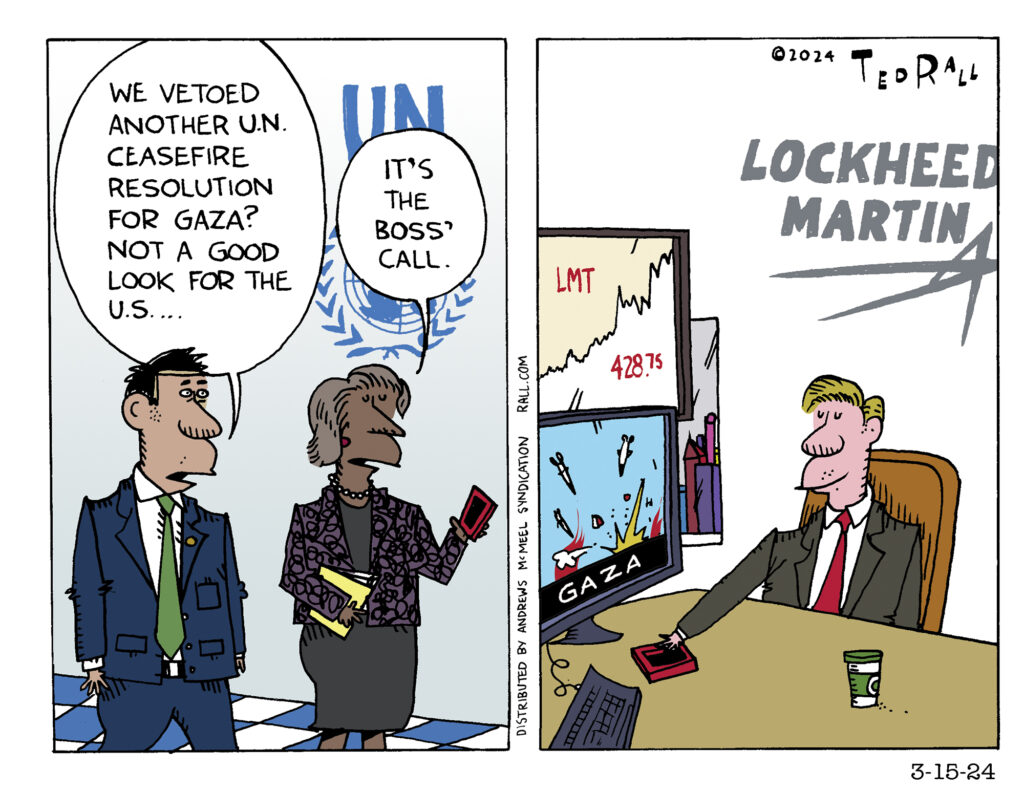In the same week, a kid shot up a public school in Georgia and a second gunman tried to assassinate former President Donald Trump. As usual, people in this highly militaristic society are asking: what is inspiring all this mayhem?
Cut the Defense Budget by 97.5%
 The United States is one of the most politically polarized countries in the world. Because effective lawmaking requires bipartisanship and members of Congress are, like their constituents, at their most ideologically divided point in a half century, cooperation is in increasingly short supply. As a result or, more precisely non-result, the U.S. Congress passes fewer bills every year.
The United States is one of the most politically polarized countries in the world. Because effective lawmaking requires bipartisanship and members of Congress are, like their constituents, at their most ideologically divided point in a half century, cooperation is in increasingly short supply. As a result or, more precisely non-result, the U.S. Congress passes fewer bills every year.
There is, however, one consistent area of agreement on Capitol Hill: defense spending. Each year for the past six decades, the massive National Defense Authorization Act—Washington-speak for the federal defense spending bill has passed with overwhelming bipartisan support. Defense appropriations are so sacrosanct that the press often describes the NDAA as “must pass”; it is routine for Congress to add in hundreds of millions of dollars of extraneous spending that the Pentagon does not want or request.
In the U.S. Congress, even “antiwar” voices support the military. Obama’s 2008 campaign was primarily predicated on his opposition to the U.S. invasion and occupation of Iraq. Yet even his GOP opponent John McCain didn’t care call out Obama on the fact that when he had six chances to vote on the Iraq War—he wasn’t in the Senate yet when it voted on the measure authorizing President George W. Bush to attack the government of Saddam Hussein—he voted to send the cash each time. Bernie Sanders has repeatedly voted to fund the military and sending weapons for wars being waged by U.S. proxies like Israel and Ukraine.
Vice President Kamala Harris, whom Republicans describe as Marxist, socialist and communist, is thoroughly committed to the cult of American militarism. “As Commander-in-Chief, I will ensure America always has the strongest, most lethal fighting force in the world,” she said in Thursday’s nomination acceptance speech at the Democratic National Convention.
The idea that military expenditures are “must pass” relies on the assumption that the U.S. faces existential threats to its safety and/or sovereignty. This is crap.
As Statfor’s classic 2011 assessment of the United States and its geopolitical position noted: “The American geography is an impressive one.”
Consider Russia. It has thousands of miles of land borders, most of it without significant natural barriers like mountain ranges or large bodies of water to deter a potential invader, millions of square miles of fairly flat lands that can quickly and easily be traversed, with numerous neighbors that are hostile and have posed a historical threat. Given its situation, Russia’s rulers have traditionally relied on friendly buffer and vassal states around its perimeter.
“The U.S. Atlantic Coast possesses more major ports than the rest of the Western Hemisphere combined,” Stratfor observed. “Two vast oceans insulated the United States from Asian and European powers, deserts separate the United States from Mexico to the south, while lakes and forests separate the population centers in Canada from those in the United States. The United States has capital, food surpluses and physical insulation in excess of every other country in the world by an exceedingly large margin.” Canada and Mexico are friendly vassal states.
“Red Dawn” was just a movie. Gun nuts who think they’ll need AR-15s to arm a Resistance against alien invaders are deluded. No one wants to invade us. No one wants to take away our freedoms.
No one can.
We are acting like the hippopotamus. Hippos are the most dangerous land animal on the planet, killing 500 human beings every year. They’re nervous and high-strung because they rapidly evolved from a much smaller creature that made easy prey. Poor things! They don’t realize that they’ve become huge, grown fearsome teeth and no longer need to be aggressive and territorial. Like the hippo, the U.S. started out small and vulnerable to aggressors like England, which re-invaded in 1812. But things have changed for both the hippo and us. Can’t we be smarter than a hippo?
The U.S. has, like other countries, faced raids like the Pearl Harbor attack and cross-border incursions from Mexico in the 19th century. In a now largely-forgotten episode, two of the Aleutian islands were occupied by Japan during World War II, before Alaska became a state. Non-state terrorists have struck the contiguous 48 states, as on 9/11. But none of those incidents, though violent and disturbing, represented anything close to an existential threat. Most other countries, faced with attacks on such a small scale, would not feel traumatized as much as merely annoyed.
We have not faced a substantial risk of territorial invasion by an enemy army or navy since the War of 1812.
In the 21st century, the U.S. faces two main threats to national security: terrorism and cyber attacks. These are addressed by, respectively, the Department of Homeland Security and the FBI. We don’t need a fleet of ships lining our coastlines or a perimeter of military bases to fend off the Germans or the Japanese or the Chinese or the Russians. And we don’t have them. The “Defense” Department doesn’t defend the U.S.; it attacks and disrupts other countries and non-state entities abroad and, far less frequently, defends U.S. allies against internal uprisings, rival factions and hostile neighbors.
Given our remarkably enviable security situation, it is entirely conceivable that the U.S. could get by eliminating its military budget entirely, as have countries like Costa Rica, Panama and Iceland, all of which have abolished their army, navy and air force and yet have not been invaded since. Could it be that, much as you are likelier to be shot by a gun if you own one, an unarmed nation is less likely to be attacked because its neighbors no longer view it as a potential threat?
Alternatively, we could decide not to continue the current practice of constantly adding new and fancier technology to our existing arsenal. We could make do with the equipment and materiel we have now, while spending enough to maintain it.
Defense should be about defense, i.e. defending our own borders. Brazil, bigger than the contiguous 48 U.S. states, and by far the dominant military power on the South American continent, has a military budget of $20 billion. That’s equivalent to 2.5% of the U.S., which currently wastes $1.6 trillion a year—more than half of discretionary federal spending.
Let’s start there.
(Ted Rall (Twitter: @tedrall), the political cartoonist, columnist and graphic novelist, co-hosts the left-vs-right DMZ America podcast with fellow cartoonist Scott Stantis. His latest book, brand-new right now, is the graphic novel 2024: Revisited.)
Old Enough to Kill, Too Young to Protest
If you are 18 years old and an antiwar protester, old militarists will say that you’re too young and naïve and ignorant to understand the complexities of foreign policy and should just shut up. But if you’re 18 years old, and you don’t know anything about anything, they are happy to send you to go kill people in those very same foreign conflicts you don’t know anything about.
The Boss Told Me To Do It
With nearly 30,000 Palestinians killed by Israel and Gaza, America’s support for the Jewish state is being tested more than ever. Now the U.S. has found itself in the position of having to vote against a ceasefire resolution for the third time. Obviously this level of support is unsustainable given the ongoing genocide.
What’s Left 2: We’re a Rich Country. Let’s Act Like It.

Lyndon Johnson, cautioned that his support of the Civil Rights Act was too bold and politically risky, famously responded: “What else is the presidency for?”
The United States of America is one of the richest, if not the richest, nation-state in the history of the world. It also is the most unequal. So its people live in misery and squalor. What else is a country’s spectacular wealth for, other than to provide a high standard of living for its citizens?
A Leftist economic programme should begin with the government’s budget. How should revenues be collected, and from whom? How should the money be spent? The Left must articulate a holistic approach to the federal budget.
According to the U.S. Treasury’s website: “The federal government collects revenue from a variety of sources, including individual income taxes, payroll taxes, corporate income taxes, and excise taxes. It also collects revenue from services like admission to national parks and customs duties.” This came to $4.44 trillion in 2023. The biggest source of this cash bonanza was income taxes.
In addition, states and cities took in about $2 trillion.
$6 trillion is, to state the most obviously obvious thing in the world, a staggering enormous amount of money. Yet we rarely take a beat to take in that fact.
Part of the reason is that it doesn’t feel like we live in a rich country with a huge amount of taxes coming into its coffers. It sure doesn’t look like one. People sleep on the streets. Factories are abandoned. Schools are worn. Hospitals are chaotic, understaffed and depressing. Storefronts are boarded up. Litter abounds. Bridges collapse, subways derail, doors fall off airplanes, high-speed rail and free college and affordable healthcare are for other countries.
Why can’t we have nice things? One can blame cycles and systems: late-stage capitalism, the duopoly, the corrupt revolving door between business and the government officials who are supposed to regulate them. Fundamentally, the answer boils down to bad priorities. The people in charge would rather spend our money on the things that they care about than what we want and need: sending weapons to other countries instead of feeding the poor, tax breaks for corporations rather than treating young men addicted to opioids, building more prisons in lieu of hiring social workers.
Reordering a society’s social and economic priorities is a complex task. To keep things relatively simple let’s set aside the comparatively lesser and infinitely more diffuse state and local budgets in order to focus upon the federal budget—round it up to $5 trillion—as the principal engine in the Left’s proposed shift of the U.S. to a country that puts people first. Further to the goal of simplification let’s assume that overall revenues remain flat in real terms adjusted for inflation—no tax cuts or hikes, no significant changes in tariffs like a trade war.
The most recent U.S. military budget, for 2024, comes in at $886 billion—by far the biggest expense, and greater than all other federal spending combined. And that’s radically understating the real cost of militarism. As the socialist journal Monthly Review calculates, when you include costs associated with medical and other expenses related to veterans, debt service on deficit spending for old wars and military aid to foreign countries, the real number doubles. So the actual 2024 total is closer to $1.6 trillion.
Recognizing that nothing makes us less safe than a forward, aggressive military posture in which U.S. forces and proxies are stationed around the globe. They are sitting ducks and provocateurs. A Left worthy of its name favors a military apparatus capable of defending the U.S.—nothing more, nothing less. We need missile defenses, border protections, a naval force to protect our coasts, the kind of domestically-focused armed forces that could have effectively responded to the 9/11 attacks. Given our exceptionally secure geographical situation, surrounded by two vast oceans and directly bordered only by two nations, both close allies, we can get defense—the real thing, not what the hegemony we buy with the Department of Defense—on the cheap.
Chalmers Johnson, the academic and great critic of the American empire, called the Pentagon to ask for a list of its overseas bases; not only could they not produce such a list, they could only estimate the number. (It’s 800, more or less.) Not knowing how many bases you are is a major sign of overextension. So is the reaction, when learning that one of your country’s soldiers has been killed in combat, of surprise that we were in that nation in the first place. We should close every last one and bring every last soldier and sailor home.
Brazil, a regional superpower that is bigger than the contiguous 48 states, has a military budget of $20 billion. That’s a rounding error, 2.5% of ours. Of course, Brazil doesn’t wage wars or plant bases on the opposite side of the planet—and neither should we. We can spend that 97.5% of that $1.6 trillion on stuff that helps rather than kills.
Next week, a look at other federal budget expenses the Left should slash so we can redirect those precious funds to addressing our wants and needs.
(Ted Rall (Twitter: @tedrall), the political cartoonist, columnist and graphic novelist, co-hosts the left-vs-right DMZ America podcast with fellow cartoonist Scott Stantis. You can support Ted’s hard-hitting political cartoons and columns and see his work first by sponsoring his work on Patreon.)
Remember: He’s the Liberal
No president or politician is perfect. But it’s especially dispiriting to see President Joe Biden actively cheerleading the genocide of the Palestinians in Gaza. Tens of thousands of civilians have been gratuitously killed in what he himself describes as indiscriminate bombing, yet he continues to defy Congress in order to send more weapons of death to Netanyahu’s barbaric regime.
Mr. President, Please Kill the Homeless Woman Who Lives Outside My Apartment
/cdn.vox-cdn.com/uploads/chorus_image/image/65080120/shutterstock_1281388108.0.jpg)
Dear Mr. President,
Won’t you please kill the homeless woman who lives on a bench on the median strip of the street near my apartment building?
She doesn’t bother me. As far as I know, she doesn’t bother anyone else either. The woman who lives in the middle of the street is nice. I like her. Last week, as I was waiting for the traffic signal to change, she beckoned softly from under her pile of soiled blankets, asking for change, and I gave her a ten-dollar bill. I’m not usually that nice. She’s that sympathetic.
I pitied her. I’ve watched her decline since spring. As six months dragged by this probably-fiftysomething-year-old woman has deteriorated from “how did someone so normal become homeless?” to talking to herself to severely sunburned to “this person will die this winter.”
It was in the high 30s last night and it will only get colder and it is not a question of when or how she’ll die—the answers are (a) this winter and (b) hypothermia—but whether the usual circle of votive candles and $5 bouquets of flowers will be placed by her bench or on the southwest corner of the intersection near the other one.
They say that dying of cold isn’t that bad. That you feel warm, cozy, disoriented.
I don’t believe them. Whatever the physical sensations, dying from cold a hundred feet from a couple hundred housing units so overheated that many New Yorkers keep their windows open all year long has got to be one hell of a lonesome suck of depressing. The nice woman who lives in the median deserves better than drawing her final breath while staring at the glow of a laptop screen through a frosted window pane the opposite side of which, under different circumstances, she would live inside.
So, Mr. President, won’t you please kill this lady? You’d be doing her a favor.
I know this isn’t your fault, sir. In a different world, you could allocate the tens of thousands of dollars needed to provide my outside neighbor with emergency shelter, transitional housing, permanent rehousing, substance abuse and/or mental health treatment. In reality, that money is tied up. The government’s budget is stretched thin. You have a massive deficit to think about.
Plus you have big expenses. For example, you’re asking Congress for $106 billion “in funding for Israel, Ukraine, countering China in the Indo-Pacific, and operations on the southern U.S. border.” These are, obviously, all very important needs. Before she succumbed to schizophrenia, the woman who is going to die in my New York neighborhood wouldn’t dream of suggesting that her desire to live indoors ought to come ahead of countering China in the Indo-Pacific.
I understand. If she hadn’t gone crazy, she’d understand too. Defense is one pot. A big pot. Anti-poverty is another pot. A very small pot. Like the tiniest pot in the smallest dollhouse ever. Everyone knows—you can’t “just” move money from one pot to another pot. That’s not something we even want to think about.
All that military spending got me thinking, though. Although Ukraine and Israel and Taiwan clearly need fighter jets and tanks and drones and ships and cyber weapons and missiles and bombs and light arms and bullets in order to kill as many Russian and Palestinian and Chinese people as possible, will they really miss…one?
Euthanizing a homeless New Yorker wouldn’t require anything as fancy as one of the MGM-140 Army Tactical Missile Systems we’re sending to Ukraine. This lady isn’t worth $1.5 million. Not to mention, one ATACM would take out a whole block or two—including my place!
I’m thinking something more modest, along the lines of the Switchblade 300 “suicide” drone, another gizmo we’re providing to Ukraine. As I’m sure you’re aware, Mr. President, the AeroVironment Switchblade is an expandable loitering munition so small it can fit in a backpack. You launch it from a tube. Then it flies to and crashes into its target, where its explosive warhead detonates. Like the homeless, it’s expendable. And it’s only $6,000!
Come on, Mr. President: We both know the Ukrainians and the Israelis and Taiwanese don’t need all the weapons we’re sending them. The Ukrainians don’t; they’re selling the extras we send them on the black market and the dark web. I only need one. One!
I know—“operations on the southern U.S. border” address an existential threat to America. What if an illegal terrorist migrant were to sneak past the border wall and make his way to New York and then were to kill the homeless woman on my street who would otherwise die of exposure this winter? Of course, that would be OK.
Still. It’s not like you can’t let $6,000 “accidently” fall out of your budget for “operations on the southern U.S. border.” Send that drone. Please blow up the old lady.
(Ted Rall (Twitter: @tedrall), the political cartoonist, columnist and graphic novelist, co-hosts the left-vs-right DMZ America podcast with fellow cartoonist Scott Stantis. You can support Ted’s hard-hitting political cartoons and columns and see his work first by sponsoring his work on Patreon.)
Related: Biden Sends Billions Overseas As Americans Starve (Short Video)







